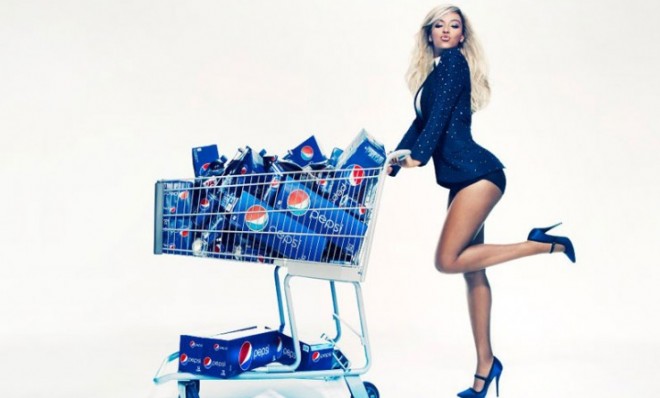Beyoncé's mega-partnership with Pepsi: What it means for both their brands
The pop star and the soda pop company are teaming up for a questionable creative campaign worth $50 million


A free daily email with the biggest news stories of the day – and the best features from TheWeek.com
You are now subscribed
Your newsletter sign-up was successful
If there's one thing we've learned from Beyoncé, it's this: If you like her, you should put a ring on her. And if you don't have a ring, a sizable chunk of cash will do. Just ask Pepsi: The pop star has landed a $50 million advertising deal with the soda company. As part of the arrangement, Beyoncé will appear in a number of ads, including one following her highly anticipated halftime show at the Super Bowl in February, and will lend her face to a limited-edition line of soda cans. But the buck doesn't stop there. In exchange for her endorsements, Pepsi will devote millions to supporting the singer's creative whims, which seem relatively undefined as of yet, and which might not mention Pepsi products at all.
So why sponsor a creative package without knowing first what it is? What's Pepsi's goal? Earning a solid reputation with consumers who are "seeking a much greater authenticity in marketing from the brands they love," says Ben Sisario at The New York Times. Through this collaboration, Pepsi can act as "artistic patron" for a star who has a huge and loyal following. But won't consumers see right through the ploy? "The plan is pure inanity for Pepsi, and I'm surprised more marketers aren't calling it out for what it is," says Jonathan Salem Baskin at Forbes, who makes the valid point that this idea isn't new. Both Britney Spears and Christina Aguilera had runs as the face of Pepsi, and the soda company came out with little to show for it, as success in this kind of case is hard to measure or attribute.
But perhaps Beyoncé has reached a pinnacle of stardom these previous artists — whose musical careers started unraveling by the time they were in their mid-twenties (Bey is 31 and going strong) — never did. It's also worth noting that the only other celebrity to have his face featured on a Pepsi can in recent history was Michael Jackson. Purely from the perspective of prestige, that's not bad company to be in.
The Week
Escape your echo chamber. Get the facts behind the news, plus analysis from multiple perspectives.

Sign up for The Week's Free Newsletters
From our morning news briefing to a weekly Good News Newsletter, get the best of The Week delivered directly to your inbox.
From our morning news briefing to a weekly Good News Newsletter, get the best of The Week delivered directly to your inbox.
For Beyoncé, her concern should be flubbing her reputation. For a performer whose music so often highlights strong, independent, and responsible women, "who runs the world? Girls... with financial support from soda makers!" might not be the best message, says Jen Chaney at The Washington Post. She also risks the prospect of selling out, or worse, overexposure. "One has to wonder if Knowles Fatigue may begin to settle over a nation that has largely embraced Beyoncé but may not be ready, just yet, to imbibe her," Chaney says.
A free daily email with the biggest news stories of the day – and the best features from TheWeek.com
Jessica Hullinger is a writer and former deputy editor of The Week Digital. Originally from the American Midwest, she completed a degree in journalism at Indiana University Bloomington before relocating to New York City, where she pursued a career in media. After joining The Week as an intern in 2010, she served as the title’s audience development manager, senior editor and deputy editor, as well as a regular guest on “The Week Unwrapped” podcast. Her writing has featured in other publications including Popular Science, Fast Company, Fortune, and Self magazine, and she loves covering science and climate-related issues.
-
 What to watch on TV this February
What to watch on TV this Februarythe week recommends An animated lawyers show, a post-apocalyptic family reunion and a revival of an early aughts comedy classic
-
 Is the US in a hiring recession?
Is the US in a hiring recession?Today's Big Question The economy is growing. Job openings are not.
-
 How to juggle saving and paying off debt
How to juggle saving and paying off debtthe explainer Putting money aside while also considering what you owe to others can be a tricky balancing act
